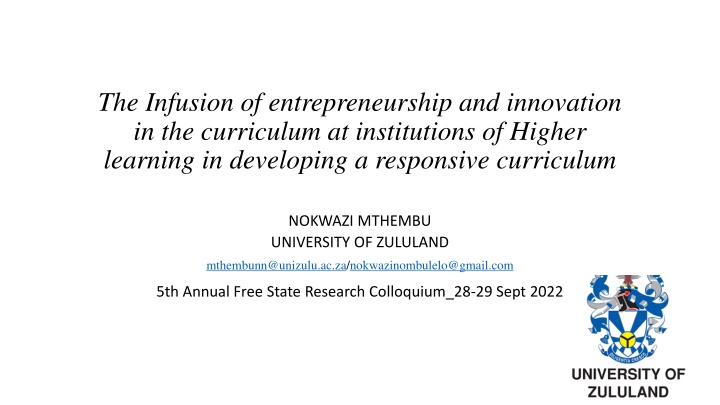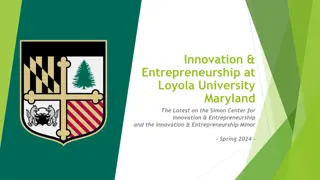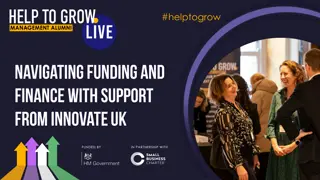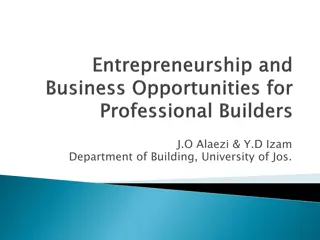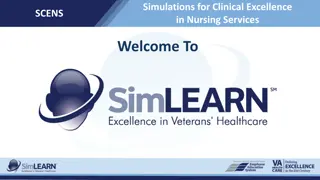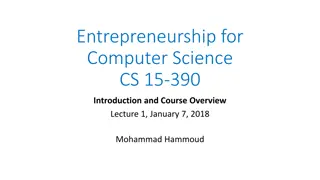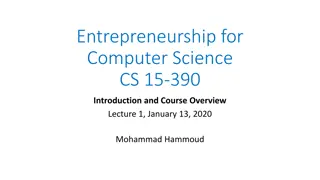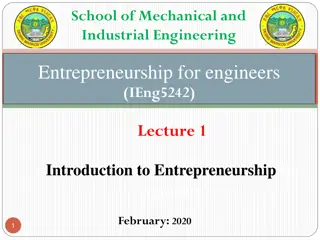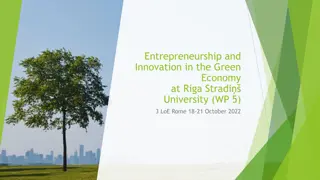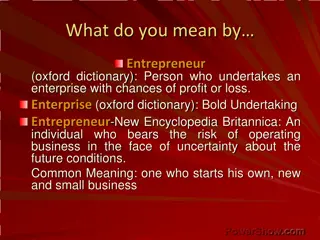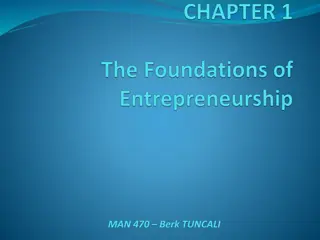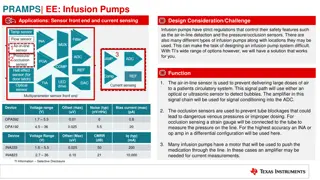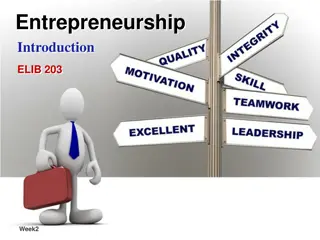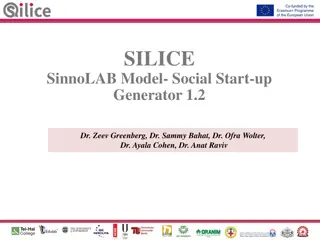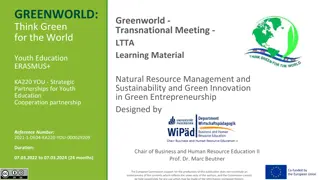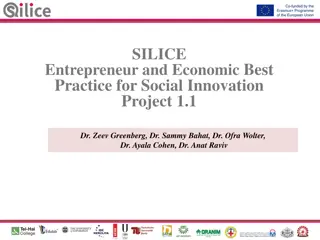Infusion of Entrepreneurship and Innovation in Higher Learning Curriculum
Unemployment persists among young graduates in South Africa, highlighting the need for institutions to integrate entrepreneurship and innovation into the curriculum. This approach aims to equip students with practical skills and mindsets to address economic challenges and enhance employment prospects. The curriculum should focus on developing entrepreneurial capacities, promoting multidisciplinary approaches, and aligning with industry needs to create responsive and transformative educational experiences.
Download Presentation

Please find below an Image/Link to download the presentation.
The content on the website is provided AS IS for your information and personal use only. It may not be sold, licensed, or shared on other websites without obtaining consent from the author.If you encounter any issues during the download, it is possible that the publisher has removed the file from their server.
You are allowed to download the files provided on this website for personal or commercial use, subject to the condition that they are used lawfully. All files are the property of their respective owners.
The content on the website is provided AS IS for your information and personal use only. It may not be sold, licensed, or shared on other websites without obtaining consent from the author.
E N D
Presentation Transcript
The Infusion of entrepreneurship and innovation in the curriculum at institutions of Higher learning in developing a responsive curriculum NOKWAZI MTHEMBU UNIVERSITY OF ZULULAND mthembunn@unizulu.ac.za/nokwazinombulelo@gmail.com 5th Annual Free State Research Colloquium_28-29 Sept 2022
INTRODUCTION Unemployment among the youth continues to be a burden, irrespective of educational attainment. Institutions of higher learning have to start and prioritise infusing entrepreneurship skills and innovation into the curriculum. Even though the graduate unemployment rate remains relatively low in South Africa compared to those of other educational levels. Unemployment is still a pandemic . Hence, there is an urgent need for the curriculum to address potent issues concerning the development of the economy and be in alignment with the industry stakeholders in addressing the economic decline and unemployment. The unemployment rate among young graduates (aged 15-24 years) declined from 40,3% to 32,6%, while it increased by 6,9 percentage points to 22,4% for those aged 25-34 years in Q1: 2022. https://www.statssa.gov.za/?p=15407 As the world shifts more and more to science and technological advancement social and technological innovation is paramount in supporting and developing South African economy.
PURPOSE The curriculum must go towards a trajectory that seeks to really delve and address the challenges on the ground. The primary goal of entrepreneurship is to develop entrepreneurial capacities and mind sets. Developing the entrepreneurial ability to identify and exploit opportunities. A well-designed Curriculum that is responsive and transformative in nature must be able to equip students with relevant knowledge with emphasis on innovation, and entrepreneurship. Increase the students' full capacities. Enhance the quality of students lives. Innovation in the curriculum should promote multidisciplinary and interdisciplinary approaches.
THE CURRICULUM IN ADDRESSING UNEMPLOYMENT Curriculum refers to the specialist professional or disciplinary knowledge that universities offer in a variety of combinations. The curriculum must be able to address potent issues and be in alignment with the industry stakeholders in addressing the economic decline and unemployment in the country. The most appropriate curriculum strategies to handle youth unemployment and reduce societal crises and poverty is the acquisition of skills to enhance human productivity. There is need for curriculum to focus on personality of the youth by making curriculum practical and relevant. This is the link between curriculum and employment. A practical curriculum must take into consideration: Entrepreneurship education, vocational and technical education, and Technology. Labour markets capacity to absorb the increasing number of new entrants, as well as provide decent and productive employment opportunities is far from sufficient.
ROLE OF ENTREPRENUERSHIP & INNOVATION IN THE CURRICULUM Equipping students with the necessary skills that will address the unemployment and economic matters in a responsive way outside the barometers of their degree certificates. The curriculum must be able to address potent issues and be in alignment with the industry stakeholders in addressing the economic decline and unemployment. The curriculum does not cater for the current world. The world has approached the fourth industrial revolution, however we may have to ask, as institutions of higher learning, are we equipped to embrace the 4IR? how do we continue to gamble with the lives of students. The infusion of entrepreneurship and innovation in HE is a need. A need that will address the unemployment crisis and student development capacity.
NATIONAL DEVELOPMENT PLAN 2030 The plan focuses on the critical capabilities needed to transform the economy and society. Achieving these capabilities is not automatic, nor will they emerge if the country continues on its present trajectory. Rising levels of frustration and impatience suggest that time is of the essence: failure to act will threaten democratic gains. In particular, South Africa must find ways to urgently reduce alarming levels of youth unemployment and to provide young people with broader opportunities.
CONTINUING National Development Plan requires progress on a broad front, three priorities stand out: Raising employment through faster economic growth. Improving the quality of education, skills development and innovation. Building the capability of the state to play a developmental, transformative role. A sustainable increase in employment will require a faster-growing economy. The National Development Plan aims to eliminate poverty and reduce inequality by 2030.
TEACHING & LEARNING and the CURRICULUM What are Learning Theories? They are conceptual frameworks, or organized principles, that describe how individuals learn and why learning happens the way it does. They provide insight on how individuals absorb, process, and retain knowledge during learning. Many factors such as prior experience, cognitive, emotional, and environmental influences, affect how understanding or views are acquired or changed and how knowledge and skills are retained. Support entrepreneurial week through promoting business hubs in universities It is important to have some understanding of the theories that have been developed to explain how individuals acquire, retain, and recall knowledge.
THEORITICAL FRAMEWORK Transformative theory M&E is informed by the transformative theory. According to Mezirow s account, engaging in both critical reflection and dialogue or discourse with others is very central to transformative learning. Transformative theory happens when other positions get us to critically engage with our own, with how our points of view and frames of reference differ or cohere with those of others and to arrive at a tentative best judgement regarding contested beliefs (Mezirow, 1997) hereafter, it also enables one to imagine alternative responses to situations and so makes one better able to work with others to solve problems, which is exactly what paper is attempting to do.
WHOSE DOING BUSINESS, WITH WHO? Infusing entrepreneurial and innovation education into the curriculum will empower graduates irrespective of their areas of specialization with skills that will enable them to engage in in-come yielding ventures if they are unable to secure salaried jobs. Institutions of Higher learning and stakeholders, should do business with smme s or student funded businesses. The universities should support ideas that will address the issue on the ground, the unemployment challenge.
CONCLUSION This will be done to equip students with the necessary skills that will address the unemployment and economic matters in a responsive way outside the barometers of their degree certificates. South Africa is facing, youth unemployment and graduates add to the list of the unemployed youth. Hence is it vital that entrepreneurship together with innovation are used to promote and support students innovative ideas or businesses. Institutions of higher learning should be able respond to the realities on the ground and be a clear navigator for economic development in national, provincial, and local government.
THANK YOU!
